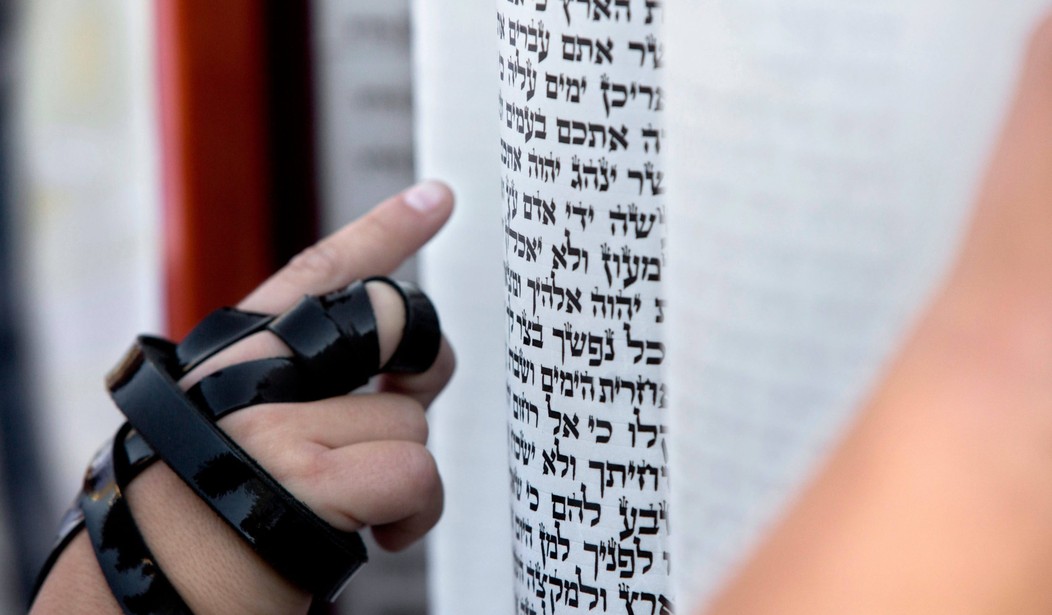Dëvar Torah – Parashath VaYéshev (Genesis XXXVI, 1 – XL, 23)
Our parasha begins the story of Yoséf (“Joseph”), which occupies the rest of the Book of Genesis. As the story opens, we are told that the seventeen-year-old Yoséf brought reports of alleged wrongdoing on the part of his brothers to his father Ya‘aqov (“Jacob”). We are also informed that Ya‘aqov loved Yoséf more than the others: “ki ben zëqunim hu’ lo.”
As Rashi informs us, the phrase is capable of two interpretations. First, Yoséf was literally a son of Ya‘aqov’s mature years, his twelfth child and eleventh son. As anyone familiar with such cases knows, such children are often coddled and spoiled more than their older siblings. Alternatively, Onqëlos translates ben zëqunim as bar chakkim, “wise son,” and Rashi elaborates that “everything that [Ya‘aqov] learnt from then on he transmitted to [Yoséf].”
Yoséf was thus his father’s most apt pupil, absorbing everything his father had to teach. It was in recognition of this superiority, Rabbi ‘Ovadya Sforno tells us, that his father gave Yoséf the këthoneth hapassim, the unique striped coat which brought his brothers’ enmity.
In addition, Yoséf had a dream that he and his brothers were gathering in the harvest, when his sheaf suddenly stood upright and their sheaves bowed down to it. Yoséf unwisely told his brothers of this dream, which was hardly likely to cause an increase in fraternal affection (XXXVII, 5, Sforno ad loc.). The Sforno also explains the dibba ra‘a, the “bad reports” of his brothers Yoséf brought to Ya‘aqov, in terms of youthful indiscretion. The verse informs us “and he was a youth” — a dangerous combination of Torah knowledge and immature judgment. The first dream was followed by another, likewise interpreted in terms of Yosef’s superiority.
As the result of these incidents, it is hardly surprising that his brothers seethed with resentment. Presented with the opportunity to get him alone, they acted to rid themselves of this irritation named Yoséf, selling him to an Arab caravan on its way to Egypt.
Yoséf’s own actions were plainly problematic and provocative; still, the Torah sources focus on Ya‘aqov’s gift of the këthoneth hapassim as the cause of all the suffering which resulted from the sale of Yoséf. The Talmud (Shabbath 10b), for instance, sternly reminds us that “a man should not distinguish between one of his sons and the other” because, as a result of Ya‘aqov’s gift, “the matter was set in motion and our forefathers descended to Egypt.”
Rabbi Aharon ha-Kohén Friedman, in his Dëvar Aharon, a commentary on the Haggada shel Pesach (the book read each year at the Passover séder), notes that this underlies one of the central rituals of the seder: the dipping of a vegetable with the mysterious name of karpas in salt water. The word karpas signifies no specific vegetable in Hebrew (people use things as diverse as potatoes, celery, and parsley for the purpose), and so the Dëvar Aharon explains the ritual as meaning that the bitter tears of Egyptian servitude (the salt water) came about when Yoséf was nimkar (“sold”) because of the këthoneth hapassim – “kar-pas.”
What could be the explanation of this monumental lack of judgment on Ya‘aqov’s part?
Our parasha begins with the verse:
And Ya‘aqov settled [vayéshev] in the land of his father’s sojournings [bë’eretz megurei aviv] in the land of Canaan.
The Talmud (Sanhedrin 106a) tells us that “every place vayéshev is said, it is none other than a term of suffering,” and cites our verse, followed immediately by the report of Yoséf’s dibba ra‘a, as an example.
At first blush, it seems hard to understand what this passage is getting at. None of the early commentators cite it in their comments on the verse. They either contrast the great detail with which the Torah treats Ya‘aqov’s settlement with the rather cursory treatment given ‘Ésav and his descendants at the end of last week’s parasha (Rashi, Even ‘Ezra, Ramban), or they explain the verse to mean that Ya‘aqov remained in that part of Canaan which had been sanctified by the presence of his forefathers Avraham and Yitzchaq (Rashbam, Sforno).
What is the link which the Sages of the Talmud perceived between the concepts of yishuv (“settling”) and tza‘ar (“suffering”)?
The key, in my humble opinion, lies in what the verse says about Ya‘aqov and about Yitzchaq. The term vayéshev implies permanent settlement, whereas the term mëgurei suggests temporary stays. One might imagine that this difference is reflected in the fact that Ya‘aqov built a house (XXXIII, 16) whereas his father had remained a tent-dwelling nomad (hence, mëgurei aviv, reflecting his wanderings). They conclude from it that Ya‘aqov had somehow forgotten the prophecy given his grandfather Avraham, “for your seed will be strangers [gér] in a land not theirs” (XIII, 15), which had obviously not yet been fulfilled. The seemingly superfluous phrase “in the land of Canaan” (since Yitzchaq never left Canaan in his life) suggests that something else is meant by eretz mëgurei aviv, and indeed the Talmud (Mëgilla 17a) deduces from the name of Ya‘aqov’s estate, Sukkoth (“Huts”), that he remained there only eighteen months.
So what does this contrast imply?
Our Sages warn us (Avoth IV,16): “This world resembles an anteroom to the world to come.” The point is that, measured against eternity, our brief time here is a short stay; “a human being resembles a breath; his days are like a passing shadow” (Psalms CXLIV, 4).
If we apply this mishna to the passage from Sanhedrin, perhaps we can understand it to mean the following: every place we find vayéshev written in the Torah, it is a sign that the incident immediately following it is a result of forgetting, however momentarily, that this world is the temporary dwelling, and the next world the permanent address.
Yitzchaq’s identifying characteristic was his tremendous G-d-fearing piety, whence was derived his gëvura, his heroic fearlessness regarding anything standing in the way of his divine service. Ya‘aqov himself paid tribute to this quality of his father’s in his final meeting with Lavan: “Had I not had my father’s G-d, G-d of Avraham and fear of Yitzchaq … ” (XXXI, 42). This world was very much the eretz mëgurei aviv, the temporary dwelling place of Ya‘aqov’s father. Yitzchaq never imagined that this world was his home.
But in what way did Ya‘aqov forget what was ever-present in his father’s mind? After all, as we saw in last week’s parasha, Ya‘aqov, confronted by the threat of ‘Ésav, prayed: “I am less than all the kindnesses … ” (XXXII ,11). Here the Talmud learns (Shabbath 32a) that Ya‘aqov did live on the knife’s edge, fearing shema yigrom hachét’, (“lest sin be a cause” of his downfall).
The great 20th century commentator Rabbi Baruch haLévi Epstein, in his Torah Tëmima, takes note of the definite prefix (“the sin”). He demonstrates on the basis of midrashim that the sin which stained his record was neglect of the commandment of honoring one’s parents. During the 34 years of his exile from home, he had been out of contact with his parents.
That Ya‘aqov’s sons had a problem with this very commandment is evident from numerous incidents. Shim‘on and Lévi failed to consult their father in their hot-headed rush to avenge the rape of their sister Dina, bringing down his rebuke (XXXIV, 30; cf. also XLIX,5-7). Rë’uvén, in his zeal to prevent what he saw as a slight on his mother’s honor, trampled on his father’s conjugal obligations (XXXV, 22, Rashi ad loc. after Shabbath 55b; cf. also XLIX, 3 — 4). And of course, in our parasha, we see that they were willing to have Ya‘aqov believe that his favorite son had been brutally killed (XXXVII, 31-35).
Ya‘aqov, until the drama of Yoséf reached its conclusion, had failed to see his own failing as it was manifest in his sons. It was in this that he was complacent, where Yitzchaq would not have been. Since the failing was manifest in someone otherwise such a great tzaddiq (righteous man), it had dire consequences for the future, being the proximate cause of the Egyptian exile.
It is in our quest to understand how Ya‘aqov could miss this that a lesson may be found for us. The first fourteen years of Ya‘aqov’s exile had been spent studying in the yëshiva of Shém and ‘Ever. Had the deans known of Ya‘aqov’s failure to write home, it is hard to believe that they would not have spoken to him about it. Certainly no modern rosh yëshiva would let it go unremarked. We are led to conclude that the mentor-student relationship was not as close as it could have been.
When the Sages tell us (Avoth I, 6): “Appoint a rav — a rabbi — for yourself and acquire a companion,” they are telling us that our personal development cannot take place without external help. We cannot see ourselves as others see us, but the clear vision of an experienced rabbi and the straight talk of an honest companion can provide us with the necessary perspective to see where we are strong and where we need work. That even one of the Patriarchs, the pillars on which our world is supported, could have had a lapse in the observance of a commandment demonstrates the desperate need for each of us to establish such relationships.









Join the conversation as a VIP Member